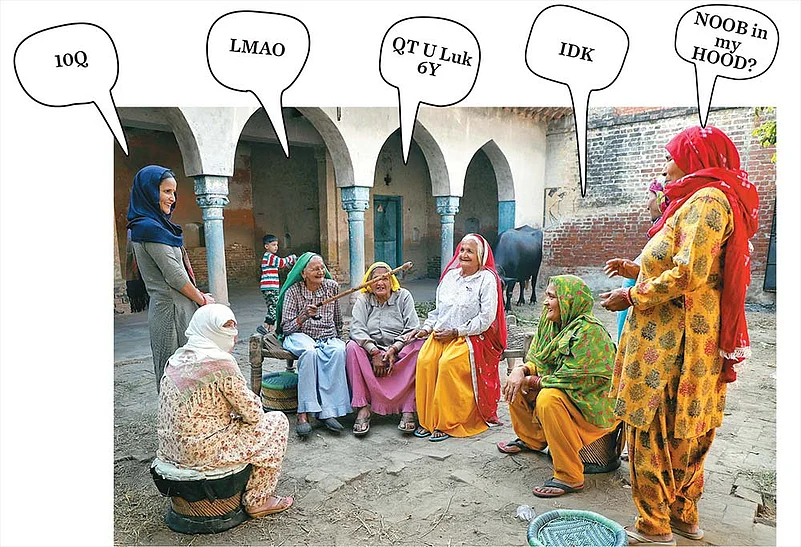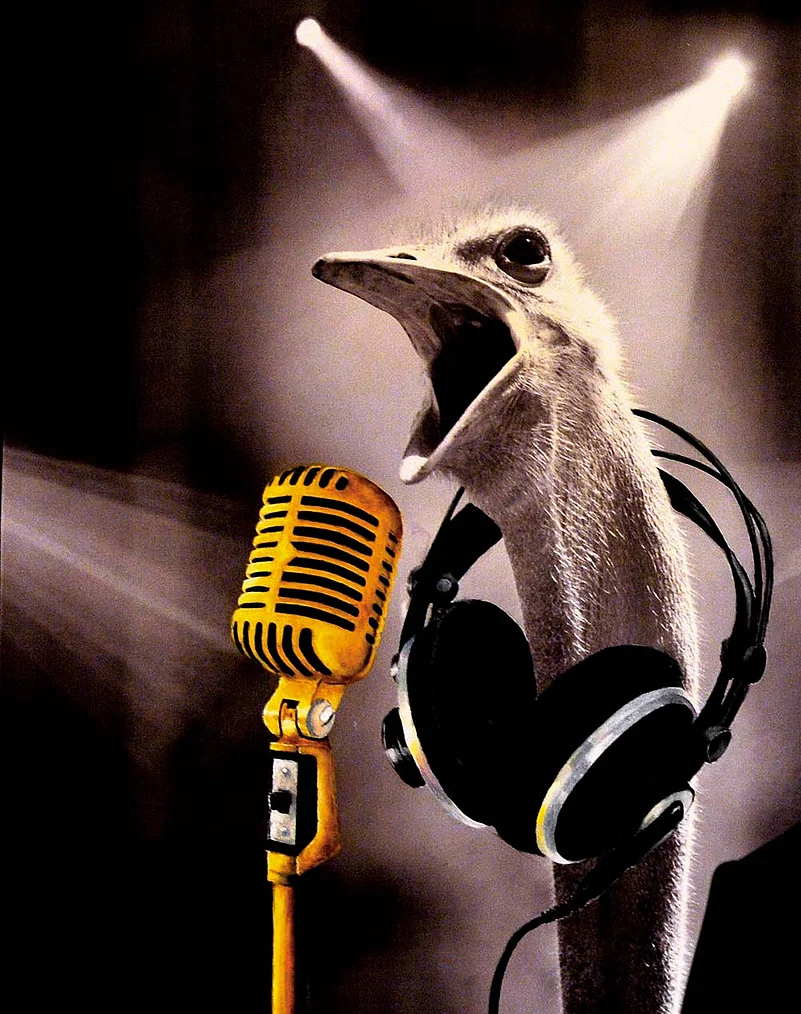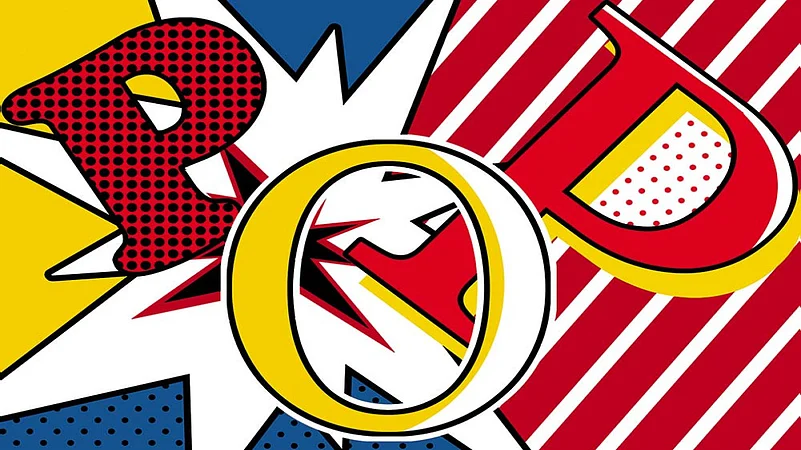Of the many apologies I owe for my years of being an idiot online, the first is owed to my childhood classmates. Somewhere on some Silicon Valley server, beyond my own reach, are early-2000s MSN Messenger chats in which I have, with proper title-casing and punctuation, accused them of complicity in the downfall of the English language. Their crime: using GTG and LOL.
I didn’t know, at 12 and 13, that living languages exist in a permanent state of such downfallings, constantly welcoming new additions as new shared experiences call for new shared vocabularies. So when the world faced a shared need to condense IRL non-verbal cues—tone, expression, body language—into the 160 characters after which an SMS would split into another, costing an extra rupee, the compression of “I’m laughing out loud” to “LOL” was really undeniably sensible.
That tone-work has now expanded into its own dialect. “LOOOL” is warm but “lol” is cutting; “hahahaha” is “that’s funny” but “haha” is “stop talking to me”; “Ok” is either professional or rude, but “k.” is unfiltered fury (the way to actually say “ok” is “kk”). And I would need a whole other essay to get into the universe of emojis-as-tonal-slang *upside-down-smiley*. Maybe, like all languages, these can only be mastered by immersion.
ALSO READ: Silver Jubilation
I should say—it’s possible all of that is completely untrue for anybody who isn’t specifically me, specifically now. Our tonal cues, like our expressions, are personal and ever-evolving. A few years ago, my colleagues staged a Slack-room intervention demanding that I stop passive-aggressively saying “Oki” to signal annoyance. I shocked them back with the admission that “Oki” was, to me, affectionate. At some point, without noticing, I stopped using it at all.
My present day WhatsApps would appall that chat-snob preteen. I hyper-use all the universal acronyms—wtf, idk, omfg—but some friends and I also break out homemade inventions. “Idkwtty” is “I don’t know what to tell you”, “bmj” is “bhaad mein jao” (not to be confused with BMKJ which is, universally, “Bharat Mata Ki Jai”), and “bwtym” is “best wishes to your mom.” (Sorry.) The need these very questionable innovations rise to meet isn’t brevity, but the need to signal intimacy using a private vocabulary when one crucial intimacy-building arena is a WhatsApp group-chat. Character limits weren’t the last challenge the internet presented to neologists.
ALSO READ: Postcards From The Newsroom
As apps drove a rise in tech-based casual dating, we learned “ghosting” and “sext.” As writers began logging everyday thoughts, along came the coinage “web-log”, which was then duly shortened to “blog”. By the 2010s, when YouTubers were self-documenting their lives, a smooth trail had been trod to “vlogger.” In 2018, “binge-watch” found a spot in the Oxford English Dictionary and by 2019, when authoritarian leaders around the world had made a habit of weaponising viral misinformation, “fake news” made its way in too. This is not the story of a language falling down, this is its construction—words are tools we craft as we need them. This year, Merriam-Webster added “physically distance.”
According to the Twitter bot @NYT_first_said, which tweets words that the New York Times has used for the first time, “katli” and “pyaaza” made their NYT debuts in November 2020. We know that neither “katli” nor “pyaaza” are new words, but their canonisation in the Times tells us that South Asian people, and therefore foods, are making their way onto American cultural centrestage. The language of any space is set by its empowered citizens. And in that sense, the more rapidly the language of the internet evolves, the better we’re doing at building an inclusive internet.
ALSO READ: At Swim, Two Birds Perched On Latticed Sites
Already, the population of social media has expanded faster than any other shared public space in human history, with fewer of the barriers and threats of violence that separate sub-cultures IRL. So the power to add new words to English lexicons, once guarded by the upper classes of Western academia and literature, is now decentralised, held by any English speaker with a social media account and some creativity. This has opened dictionary doors to all sorts of subversions.
Like: despite African Americans and queer folk being two of the world’s most historically oppressed populations, every Westernised teen in the world now speaks their slang. “Yaaass” (an expression of support) and “fire” (attractive) and “tea” (gossip) were all inventions of Black drag communities, and the new use of “cancelling” to mean culturally boycotting a non-progressive person or entity rose first among Black Twitter users. The global adoption of these words speaks to an ongoing American cultural imperialism among English-speakers everywhere—but at least it isn’t purely Cis-Male White American imperialism? Either way, to say “tea is cancelled” to a TikTok-savvy teen would not at all convey that a tea-party has been called off, but that the concept of gossiping is no longer considered progressive ¯\_(ツ)_/¯…
ALSO READ: The Bully Wears A Tailored Suit
But the impossibility of elitist linguistic gatekeeping online was a lesson Indian compradors of colonialism were slow to learn. Through the 2000s and early 2010s, when social media access was restricted to urban, English-speaking, Brahmin upper classes, nothing was considered funnier than pointing at the grammatical lapses and spelling errors of the less English-fluent.
Slews of viral lists, including some I myself wrote, collated errors on signage. “SHOPLIFTERS WILL BE PROSTITUTED” was peak humour and I had the page-views to prove it. Other major memes of the era found their virality in English gone wrong. Consider “Will you do franship with me?”—shorthand for the widespread mockery of non-native English speakers’ Facebook messages to strangers. Or “How can she slap?”—the line that a gameshow contestant, when he’d been slapped by the host, shouted in his defence for slapping her back (lots to unpack there, yes). Or “Hot a What Bhaabhabhiat”, which blew up when a Savita Bhabhi comic showed a bra salesman arriving at Savita Bhabhi’s door and, instead of saying “Wow! What a hot bhabhi!” said… “Hot a What Bhaabhabhiat.”

*Newbie in my neighbourhood?; I don’t know; Cutie you look sexy; Laughing my ass off; Laughing out loud; Thank you
(When I sent that comic to a teen cousin in Delhi, she replied “SKSKSKSK” which I had to look up the origins of. Dictionary.com explains: the Portuguese-speaking internet, as far back as 2009, was using “sksksk” as keysmash—i.e. when something is so emotionally overwhelming that the only way to respond to it is to smash your keyboard. The English-speaking internet, which has typically keysmashed with some version of “asdhjfdks”, seems to now have adopted the Brazilian “sksksk.” Another article defined “sksksk” as Gen-Z for “I can’t even,” which is now-retired Millennial-speak for “I can’t even begin to describe how I feel”, a sentence that I’m sure used to be uttered in full in some ancient, lost world of Jurassic innocence.)
ALSO READ: In The Beginning, There Was The Spider
Thankfully, elites weren’t allowed to dominate Indian internet English speech norms for long. Our cyber penetration rose from 7.5 per cent in 2010 to 50 per cent in 2020, and with growing diversity in India’s online voices and the global spread of social justice discourse came calls for inclusivity. The previously uncontested power of privileged folks to set the terms of discourse began, finally, encountering voices of contestation, and jokes or smug punchlines that relied on pointing out “bad English” made the transition from Cool to Problematic. Several of us who’d done it earlier swallowed our guilt and changed our ways. By 2017, when the ‘exasperating farrago’ that is Shashi Tharoor’s vocabulary achieved Meme Status, the punchline wasn’t someone’s English being poor, but that it was too rich.
If you miss the genre though, don’t stress: the classism torch lives on globally as racism, burning bright on the Reddit forum r/IndianPeopleFacebook and in the meme “bobs and vagene”—a misspelling of “boobs and vagina,” of course—which mocks Indian men’s brazen online creepiness in demanding pictures of “bobs” from women they don’t know, but does so using linguistic discrimination, which makes it somehow both progressive and problematic. Idkwtty.
ALSO READ: Can Machines Talk?
In the last five years, as anti-caste activists have found growing audiences online, the contest to elite English has included a widened push to de-caste how we speak. In a 2018 video called “Casteist Slurs You Need To Know,” Muslim-OBC writer Divya Kandukuri listed casteist slang used around India and called for viewers to stop using it—words including “bhangi”, “kameena” and “ghaati”, and the dictionary-approved “pariah”. In 2018, Dalit writer Yogesh Maitreya published an essay on BuzzFeed titled, “My English Isn’t Broken; Your English is Brahmin,” in which he described his experience in an English literature Masters programme. “I was on many occasions told that I made grammatical errors in what I said, that my pronunciations were incorrect,” he wrote. “This anxiety to ‘correct’ me and many Dalits like me when it comes to English was nothing but an exercise to use the position of domination.” And for years, in articles, tweets and YouTube interviews, Dalit thinkers have made calls for retiring the widely used “upper caste” and “lower caste” and replacing them with the more historically accurate, less inherently hierarchical “oppressor caste” and “oppressed caste”.

Such calls for India to speak a less casteist English aren’t new. Proponents for any type of equality have a long tradition of interrogating speech norms. If collective language is a mirror to collective experience, the question activists ask is: well, whose experience is allowed to represent the collective? The internet has merely accelerated the ability of this questioning to reach oppressor groups.
ALSO READ: Future Grid
And when words for everyday oppressions don’t already exist, the internet allows for collective coinage. The English I’ve known has always had place for “hysterical”, built on the Latin word for uterus: “hystericus”. But in 2018, dictionaries also made room for “mansplaining”, which women in online forums had been using since 2008 to describe the very common experience, both online and off, of men condescendingly explaining to us concepts that we already understand. In a 2017 essay called How Caste Gets Clickbaited, Dalit writer Shivani Channan debuted the term “Manusplaining”—“when a savarna justifies and denies” the oppressive values of the Manusmriti.
Sadly, the linguistic innovations of equality activism online are met with similarly innovative resistance. Anybody who’s critiqued Hindutva, the RSS or the BJP on Twitter is familiar with “liberandu”—a tragically sticky portmanteau of “liberal” and “gandu”. Or consider “feminazi”—a feminist who’s apparently so stringent about calling out daily sexism that she’s equatable to a Nazi. Or “slacktivist” and “keyboard warrior”—accusations that someone is outspokenly progressive online but doesn’t engage in real-world change-making. The most heartbreaking linguistic victory of the socially conservative is that the really lovely word “snowflake” which earlier only meant…well, a snowflake…has now been used so often to deride people who call out everyday injustices that, in 2018, the OED expanded its definition to include an alternate meaning: “an overly sensitive or easily offended person (informal, derogatory).”
In a sense, I get it. Folks flinging around “snowflake” and “feminazi” aren’t all that different from an upper-class, oppressor-caste, wholly Westernised 12-year-old in Chennai, ranting on MSN that “GTG” was sacrilege of Proper English. Watching the world change can be a disorienting thing, more so when one has inherited mastery over the old world’s old rules. But if my LOL-worthy journey from “LOL is the downfall of the Queen’s English!!!” to (well) “LOL-worthy” teaches us anything, it’s that gatekeepers can flail and resist all they like. The world, tossing a “bmj” in their general direction, goes ahead and changes anyway. BMKJ.
ALSO READ
Rega Jha is a writer-columnist, did her time on the digital media frontline as the founding editor-in-chief of BuzzFeed India.


























